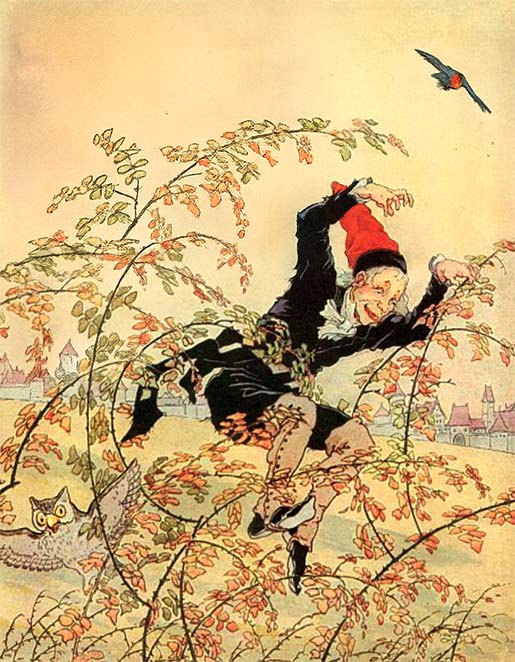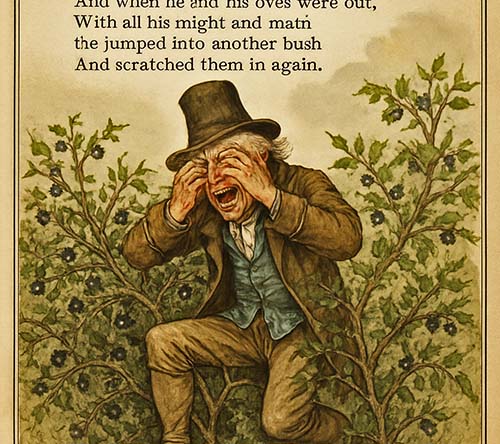There Was a Man in Our Town
There was a man in our town,
And he was wondrous wise,
He jumped into a bramble-bush,
And scratched out both his eyes;
And when he saw his eyes were out,
With all his might and main
He jumped into another bush
And scratched them in again.

Origins
The rhyme is pretty old; the earliest printed version that scholars agree on is Tommy Thumb’s Pretty Song Book from 1744, under a similar title, “A Man so Wise.” That shows the core of the rhyme — the wise man, the bush, the eye-scratching — was already familiar in the mid-18th century. Later, it turned up in more children’s collections through the 19th and early 20th centuries.
Versions with “Thessaly” suggest the rhyme shifted or was relocated in oral tradition. Maybe “Thessaly” was used because it had a poetic ring, or because local storytellers borrowed it from classical or folk sources. The variation between “bramble bush,” “thorn bush,” or “quickset hedge” also shows how the rhyme got adapted depending on what kinds of bushes people knew around them.
Meaning
At first, it looks like absurdity. A man calls himself “wondrous wise” yet jumps into a bush and gouges out his eyes — then, on seeing them gone, dives into a second bush to put them back. It’s a paradox: wise, yet foolish; harming oneself, then restoring what was lost.
There are a few deeper shades:
-
It’s a mockery of vanity or self-belief. Maybe the rhyme satirizes people who claim wisdom but act against their own interest.
-
It could be a riddle of folly: wisdom isn’t what you say, it’s what you do.
-
The versions using Thessaly may connect to classical or mythic sources (Thessaly is a place in ancient Greece), perhaps giving a sense of “old wise man” archetype rather than a specific person.
Still, there is no well-documented historical figure or incident tied to it. It seems the power of the rhyme lies in its contrast: foolish action described in the strongest terms (“wondrous wise,” “all his might and main”), which makes it memorable.

This rhyme sits among nursery verses that are absurd, paradoxical, even a bit grotesque. Children’s rhyme traditions often include silly or shocking images (losing eyes, wild jumps) because they stick in the memory.
In rural or semi-rural England (where many of these rhymes originated), bramble or thorn bushes were part of everyday life. Scratches, stings, etc., were things kids knew about. So the setting isn’t exotic—it’s close to home. The idea that someone would willingly do something dangerous, then regret it only to repeat it (jumping into another bush) resonates with fairy‐tale logic or folk joke logic.
Also, “wondrous wise” is part of the joke; it sets up expectations and then undercuts them. That’s a pattern in folk humor: declare something grand, then show it’s foolish.